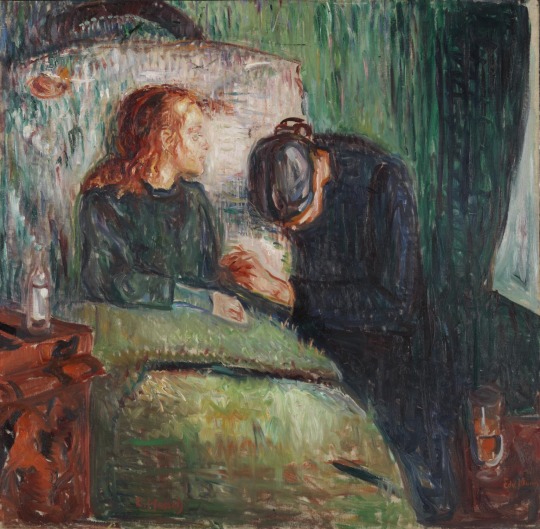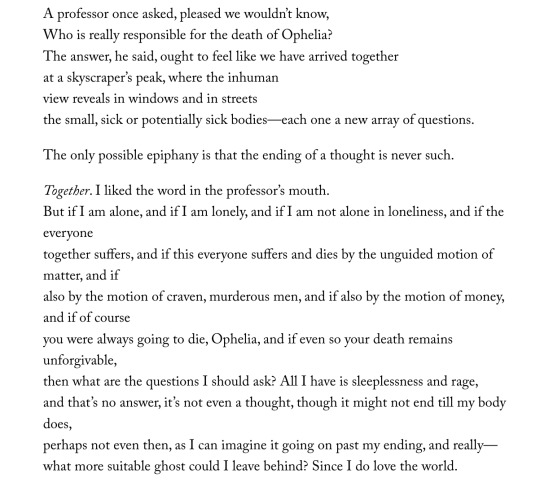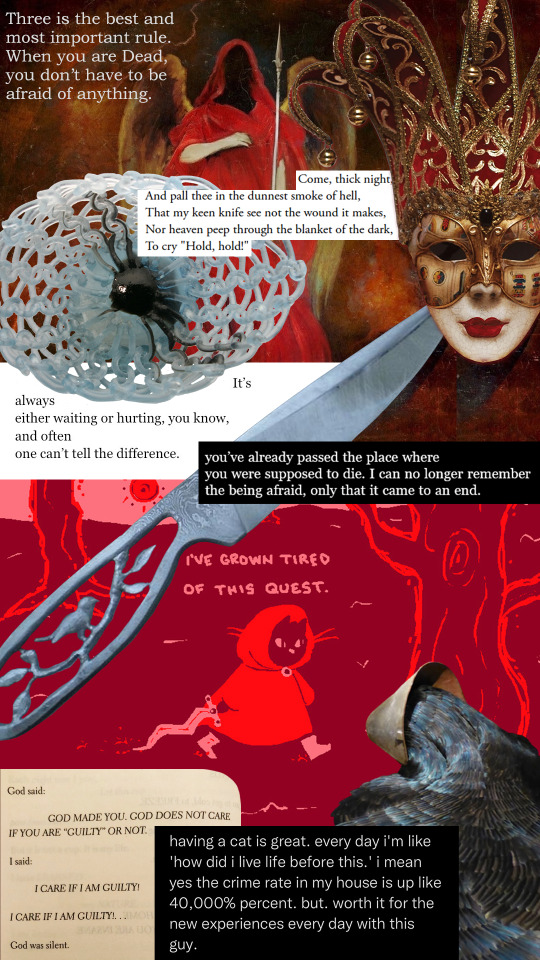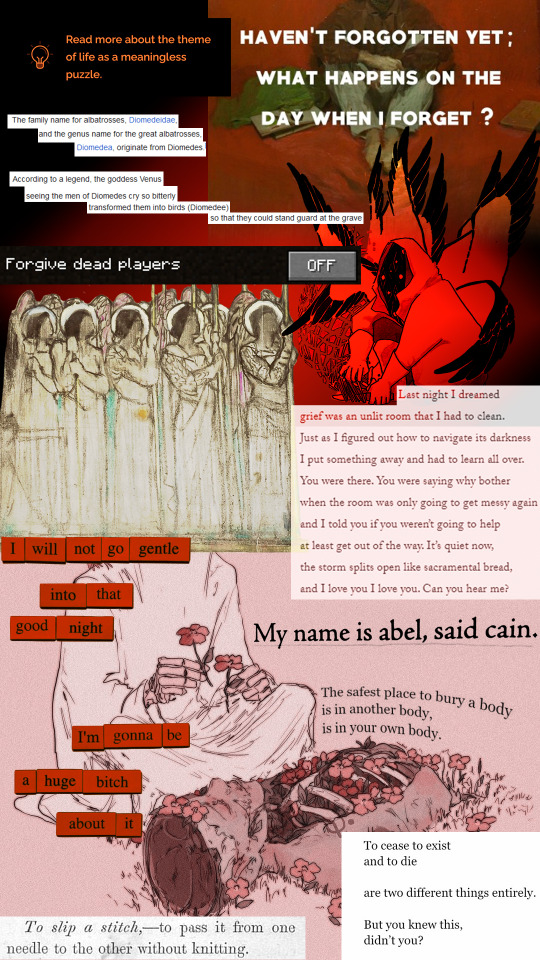#elisa gonzalez
Text
Since I was very young, I’ve been terrified of my own potential to do evil. No vision or dream taught me. From experience, I recognized that people, like things, are fragile; that they are endlessly imbricated; that intention and effect often have no relation; that I, insofar as I knew myself, contained malice, and that other people did too, because I’d suffered theirs. At a young age, I vowed to be “unselfish,” my version of harm being equated with the primacy of the self. I’ve developed a more sophisticated morality, but that vow is deeply embedded. I do, in fact, seek to be good, despite the inevitability of failure. I don’t think this is just a hangover of childhood habit; in the Bible I have found truth as well as beauty, and in theologians like James Cone and Howard Thurman, among many others, I have found a vision of Christianity written by and for the oppressed. […] Do you see God everywhere? Now what will you do?
— Elisa Gonzalez, in “No Good Has Come: Marilynne Robinson’s testimony for the white church”
754 notes
·
View notes
Text





1. After My Brother’s Death, I Reflect on the Iliad - Elisa Gonzalez / 2. It - Stephen King / 3. The Sick Child - Edvard Munch / 4. The Sky Is Everywhere - Jandy Nelson / 5. Killing Flies - Michael Dickman
#the munch painting was inspired by the death of his sister#he was haunted by her death all his life & he painted a ton of variations of this#parallels#web weaving#web weave#words#poetry#art#elisa gonzalez#stephen king#edvard munch#jandy nelson#michael dickman
472 notes
·
View notes
Quote
The most paradisiacal human trait is that we are inevitably surprised by death’s reality, despite its inevitability. The death of someone whom you love is a discovery of Death in the abstract as well as the particular: the appearance of disappearance, not only of the dead person, but of yourself. A quicksand pause: the absence of yourself from time. The sense of being ejected from time’s usual flow is common among the grieving, from my anecdotal polling. A writer who also lost a brother young, and violently, told me that at some point—he did not give a date or duration that must be exceeded—I would “rejoin time,” but, he added, if my experience turned out anything like his, some days, even decades later, would be “that first day after again.” Time, I suspect, will never move as it did before, even after I step back into it.
Elisa Gonzalez, from “Minor Resurrections: On failing to raise the dead” (The Point #28)
790 notes
·
View notes
Quote
I wasn’t alone in this. In the Iliad, Priam’s recovery of Hector’s body is a triumph of vulnerability over pride and power: “I have kissed the hand of the man who killed my son.” Gilgamesh violently laments over Enkidu’s corpse until maggots creep out of his nose, and then embarks on a futile quest for immortality. Many of Ovid’s metamorphoses occur in the extremity of grief as an excess of energy transforms the world, if not in the way the grieving wish: Phaethon’s sisters slowly harden and leaf into poplars at his grave; the stone Niobe weeps for her children; Hecuba, enraged about the murder of her son, morphs into a literal bitch, snapping and biting forever. Orpheus, pleading “for a loan,” makes “the bloodless shades weep.” Demeter lays waste to the earth. Something must change. In such moments, it is not hard to believe that you could resurrect one person, if you could find the right words or the right path to the underworld—and, crucially, out again. The problem seems one of method, not power. This essay is the fruit of a necromantic passion, and an emblem of failure. I remain sister to a dead man.
Elisa Gonzalez
695 notes
·
View notes
Text


in quarantine, i reflect on the death of ophelia by Elisa Gonzalez
11 notes
·
View notes
Text
national poetry month, day 21
After My Brother’s Death, I Reflect on the Iliad
The water cuts out while shampoo still clogs my hair.
The nurse who swabs my nose hopes I don’t have the virus, it’s a bitch.
The building across from the cemetery calls itself LIFE STORAGE.
My little brother was shot, I tell the barista who asks how things have been,
and tip extra for her inconvenience. We speak only
to the dead, someone tells me—to comfort, I assume, or inspire,
but I take it literally, as I am wont: even my shut up and fuck and let’s cook tonight,
those are for you, Stephen. You won’t come to me in my dreams,
so I must communicate by other avenues.
A friend sends an image from Cy Twombly’s “Fifty Days at Iliam”
—a red bloom, the words “like a fire that consumes all before it”—
and asks: Have you seen this? It’s at the Philadelphia Museum of Art.
If I have, I can’t remember, though I did visit
with you, when you were eleven or twelve, when you tripped
silent alarm after silent alarm, skating out of each room
as guards jostled in, and I—though charged with keeping you
from trouble—joined the game, and the whole time we never laughed,
not till we were released into the grand air we couldn’t touch and could.
You are dead at twenty-two. As I rinse dishes, fumble for my keys, buy kale and radishes,
in my ear Priam repeats, I have kissed the hand of the man who killed my son.
Would I do that? I ask as I pass the store labelled SIGNS SIGNS.
I’ve studied the mug shot of the man who killed you; I can imagine his hands.
Of course I would. Each finger, even.
To hold your body again. And to resurrect you? Who knows what I am capable of.
If I were. Nights, I replay news footage: your blood on asphalt, sheen behind caution tape.
Homer’s similes, I’ve been told, are holes cut in the cloth between the world of war
and another, more peaceful world. On rereading, I find even there, a man kills his neighbor.
“Let Achilles cut me down, / as soon as I have taken my son into my arms
and have satisfied my desire for grief”—this, my mind’s new refrain
in the pharmacy queue, in the train’s rattling frame.
The same friend and I discuss a line by Zbigniew Herbert
“where a distant fire is burning / like a page of the Iliad.”
It’s nearly an ontological question, my friend says, the instability of reference:
The fires in the pages of the poem, the literal page set afire.
We see double.
You are the boy in the museum. You are the body consumed, ash.
Alone in a London museum, I saw a watercolor of twin flames, one black, one a gauzy red,
only to learn the title is “Boats at Sea.” It’s like how sometimes I forget you’re gone.
But it’s not like that, is it? Not at all. When in this world, similes carry us nowhere.
And now I see again the boy pelting through those galleries
a boy not you, a flash of red, red, chasing, or being chased—
Or did I invent him? Mischief companion. Brother. Listen to me
plead for your life though even in the dream I know you’re already dead.
How do I insure my desire for grief is never satisfied? Was Priam’s ever?
I tell my friend, I want the page itself to burn.
—Elisa Gonzalez
#elisa gonzalez#after my brother's death i reflect on the iliad#poetry#national poetry month#npm2023#grief
4 notes
·
View notes
Text

The water cuts out while shampoo still clogs my hair.
The nurse who swabs my nose hopes I don’t have the virus, it’s a bitch.
The building across from the cemetery calls itself life storage.
My little brother was shot, I tell the barista who asks how things have been,
and tip extra for her inconvenience. We speak only
to the dead, someone tells me—to comfort, I assume, or inspire,
but I take it literally, as I am wont: even my shut up and fuck and let’s cook tonight,
those are for you, Stephen. You won’t come to me in my dreams,
so I must communicate by other avenues.
A friend sends an image from Cy Twombly’s “Fifty Days at Iliam”
—a red bloom, the words “like a fire that consumes all before it”—
and asks: Have you seen this? It’s at the Philadelphia Museum of Art.
If I have, I can’t remember, though I did visit
with you, when you were eleven or twelve, when you tripped
silent alarm after silent alarm, skating out of each room
as guards jostled in, and I—though charged with keeping you
from trouble—joined the game, and the whole time we never laughed,
not till we were released into the grand air we couldn’t touch and could.
You are dead at twenty-two. As I rinse dishes, fumble for my keys, buy kale and radishes,
in my ear Priam repeats, I have kissed the hand of the man who killed my son.
Would I do that? I ask as I pass the store labelled signs signs.
I’ve studied the mug shot of the man who killed you; I can imagine his hands.
Of course I would. Each finger, even.
To hold your body again. And to resurrect you? Who knows what I am capable of.
If I were. Nights, I replay news footage: your blood on asphalt, sheen behind caution tape.
Homer’s similes, I’ve been told, are holes cut in the cloth between the world of war
and another, more peaceful world. On rereading, I find even there, a man kills his neighbor.
“Let Achilles cut me down, / as soon as I have taken my son into my arms
and have satisfied my desire for grief”—this, my mind’s new refrain
in the pharmacy queue, in the train’s rattling frame.
The same friend and I discuss a line by Zbigniew Herbert
“where a distant fire is burning / like a page of the Iliad.”
It’s nearly an ontological question, my friend says, the instability of reference:
The fires in the pages of the poem, the literal page set afire.
We see double.
You are the boy in the museum. You are the body consumed, ash.
Alone in a London museum, I saw a watercolor of twin flames, one black, one a gauzy red,
only to learn the title is “Boats at Sea.” It’s like how sometimes I forget you’re gone.
But it’s not like that, is it? Not at all. When in this world, similes carry us nowhere.
And now I see again the boy pelting through those galleries
a boy not you, a flash of red, red, chasing, or being chased—
Or did I invent him? Mischief companion. Brother. Listen to me
plead for your life though even in the dream I know you’re already dead.
How do I insure my desire for grief is never satisfied? Was Priam’s ever?
I tell my friend, I want the page itself to burn.
Published in the print edition of the April 25 & May 2, 2022, issue.
7 notes
·
View notes
Photo

Love Songs: “Hang With Me”
“In her demands, I hear seduction, the kind that plays out when you’re already in bed with someone, whispering ‘we can’t’ while you do.”
https://www.theparisreview.org/blog/2023/02/15/love-songs-hang-with-me/
#On Music#Featured#friendship#John Ashbery#love songs#queerness#ROBYN#Elisa Gonzalez#The Paris Review
0 notes
Text
round 2 (10/64)


#elisa y marcela#elisa and marcela#natalia de molina#greta fernandez#i care a lot#rosamund pike#marla grayson#eiza gonzalez#round 2
11 notes
·
View notes
Text
Fantastic Fest 2022 – Film Review – Amazing Elisa (2022)
Fantastic Fest 2022 – Film Review – Amazing Elisa (2022)
#FantasticFest2022 #amazingelisa @filmax #worldcinema
Shot with unflinching operating theatre precision this stripped-back and surreal fantasy drama from Spain is as uncomfortable as it is unclassifiable.
Elisa is an intelligent and articulate 12-year-old who has retreated into a world of comic book superheroes after the accidental death of her mother. So much so that she has vivid delusions that she possesses powers of her own such as impunity to…

View On WordPress
#2022 Fantastic Fest#Amazing Elisa#Asier Etxeandia#Ivan Massague#Jana San Antonio#Sadrac Gonzalez-Perellon#Silvia Abascal#spain
0 notes
Text
poetry recommendations for december
The Untrustworthy Speaker by Louise Glück
Ashes and Blossoms by Faiz Ahmad Faiz
Raw With Love by Charles Bukowski
Dear [ ] by Nick Lantz
The Language of the Birds by Richard Siken
A Prayer by Antoine de Saint-Exupéry
Snowdrops by Louise Glück
The Road Away by Kim Sowol
From June to December: Summer Villanelle by Wendy Cope
“After My Brother's Death, I Reflect on the Iliad,” by Elisa Gonzalez
Letter to a Lost Friend by Barbara Hamby
buy me a coffee
#literature#poetry#poems#poetry recs#book recs#december#translated literature#classic literature#dark academia#romantic academia#light academia#poem
4K notes
·
View notes
Text
“When Mary Magdalene meets the resurrected Jesus, she looks right at him, but does not recognize him, “supposing him to be a gardener.” Only when he addresses her does she realize who he is. She turns toward him. John does not describe the action, only the dialogue, so it is left to us to imagine what leads Jesus to say, in the Latin that has become metonym for the scene as a whole, Noli me tangere, usually translated as “do not touch me” or “do not hold me.” The noli me tangere encounter is another one artists cannot resist. There are myriad arrangements of Jesus and Mary Magdalene: his hand stretches out in refusal, she kneels, he bends, they both stand, they look at each other, one looks away. Almost always she reaches for him. Sometimes she makes contact. The multitude of portraits reflects the ambiguity of the simple phrase, which opens a range of possible relations. Perhaps he rejects her touch because he cannot bear the shock of intimacy, divided as they are by the fact of the resurrection. Perhaps, even as he speaks, he touches her, to hold her away from him. It’s possible, the philosopher Jean-Luc Nancy argues, to translate the phrase as “do not wish to touch me.” If you do, then it becomes an exhortation to love the death too, because it is intrinsic to every life. Meanwhile, Mary’s hands hang in the air. Resurrection is Dante’s eternal rotation, “spurred on by flaming love”: it is the ongoing allegiance to keeping in sight the appearance of disappearance. It is living as if. It is a game of hands, an everlasting reaching after what escapes, what you love.”
— Elisa Gonzalez, in “Minor Resurrections: On failing to raise the dead”
#DO NOT WISH TO TOUCH ME. it becomes an exhortation to love the death too because it is intrinsic to every life#it is living as if. it is a game of hands an everlasting reaching after what escapes what you love#this is insane#w#lit#elisa gonzalez#love with no place to go
2K notes
·
View notes
Text




solving counting sheep webweave
MCYTblr AU Fest Summer 2023 // sources under readmore
Created as a treat for the absolutely stunning fic by @theminecraftbee!
What is a webweave?
Previous art: Third Life | Void Falling | Attempt 33 | Martyn | Limited Life | Nightingale Chapter 1 | Chapter 2 | singing songs to the secrets behind my eye | A Hundred Things We Had Not Dreamed Of
Pt. 1: The Specialist’s Hat, Stranger Things Happen p.63 / Kelly Link ◆ Requiem Angel / Daniele Valeriani via @satanasaeternus ◆ Maschera Venetian Joker Mask / Atelier Marega Mask ◆ Macbeth 1.5.57-61 / Shakespeare ◆ Watch / Carol Milne ◆ Excerpt from Salt Is For Curing / Sonia Vatomsky via @geryone ◆ Carved Damascus Steel Bird Knife / Robert Mayo ◆ Excerpt from STOP ME IF YOU’VE HEARD THIS ONE BEFORE, Calling a Wolf a Wolf / Kaveh Akbar ◆ off to finish it at the source / @catcrumb ◆ Excerpt from The War of Vaslav Nijinsky / Frank Bidart ◆ Having a cat is great tweet / @premeesaurus ◆ Secrete / Kate MccGwire via @snailspng
Pt. 2: I am asking you to endure it. / @intactics (Deactivated 12.31.21) ◆ Hi! You have great eyes / @illness (Deactivated 3.25.18) ◆ Taste for Independence Cat / @alisonzai ◆ Support Mental Health pin / @snailspng ◆ A Barn at Kronetorp, Skåne / Gustaf Rydberg ◆ Living: There is a period when it is clear... / Jenny Holzer via @funeral ◆ Neighborhood Plague, Fjords I / Zachary Schomburg ◆ Ugly, Bitter, and True / Suzanne Rivecca ◆ It just keeps happening / @mothcub ◆ Shepherd with Flock of Sheep / Anton Mauve ◆ No Longer Evil cat / @b0nkcreat ◆ Excerpt from All Our Futures / Jody Chan via @geryone ◆ Speak Softly and Carry a Big Stitch / Carol Milne via @knithacker ◆ Deep Dark Fear (9.29.2013) / Fran Krause @deep-dark-fears
Pt. 3: Read more pop-up / @screenshotsofdespair ◆ Combination of Painter Javier Palacios and Enoch 18:14 / @mountainqoats ◆ Wandering Albatross ◆ Diomedes ◆ Forgive dead players: OFF / @screenshotsofdespair ◆ Inktober52 Angel / @lastmousequeen-blog ◆ The Heavenly Host / Violet Oakley ◆ Excerpt from No Rush / Todd Dillard ◆ I will not go gentle magnets / @carpethedamndiem ◆ Excerpt from cain / José Saramago via @ilumark (Deactivated 2.5.22) ◆ Excerpt from Salt Is For Curing / Sonya Vatomsky via @geryone ◆ Purple / @ungfio via @sosuperawesome ◆ Excerpt from Lessons on Expulsion / Erika Sánchez via @geryone ◆ The Practical Companion to the Work-Table, Containing Directions for Knitting, Netting, & Crochet Work / Elizabeth Jackson via @knittinghistory
Pt. 4: Excerpt from A Ghost is a Memory / GennaRose Nethercott via @tolerateit ◆ What’s done is done / @thatsbelievable ◆ Excerpt from Ante body / Marwa Helal via @geryone ◆ Minor Resurrections / Elisa Gonzalez ◆ Mirror ◆ Coming back / @ungfio ◆ Candlestick ◆ Flame
#webweave#solving counting sheep#salem art#web weave#mcytblr#three#mcytblraufest23#mcytblraufest2023#do not remember which of those tags is correct lol#ALSO I believe tagging someone multiple times only alerts them once. if that is not the case a preemptive apology to geryone#i debated including panel 4 at all or under readmore or whatever#but honestly i feel like even if its not as pretty it says something I really want to say
600 notes
·
View notes
Text
I am horribly in love. When we take shelter under a balcony, I say,
We could be each other's great tragedies had the world not slaked
us already:
—Elisa Gonzalez, from "Notes on a Divided Island" (Grand Tour: Poems, Farrar, Straus and Giroux, 2023)
#quotations#poetry#elisa gonzalez#grand tour#on love#on tragedy#recently read#being in love#means you are completely broken
2 notes
·
View notes
Quote
After his wife died, Czesław Miłosz wrote a version of the Orpheus and Eurydice myth. His poem makes Orpheus’s failure an intrinsic consequence of his humanity, not an avoidable error. As he travels up, up, he hears—he thinks—the tap-tap of Eurydice’s feet behind. When he pauses, the footsteps halt; when he continues, they do too. Are these steps an echo or another person? “Under his faith a doubt sprang up,” a doubt whose only source is himself: he’s been given clear instructions, and he could just as easily interpret the footsteps as evidence of her perfect following, patiently pausing whenever he does. But, though he does keep walking without glancing back, he has already started to mourn the loss “of the human hope for the resurrection of the dead.” Both the hope and its failure to convince are human impulses, and even Orpheus could not sustain a belief in his own success. When he turns, everything is “as he expected … behind him on the path was no one.” None of Ovid’s outstretched arms and whirling winds. Eurydice’s long gone. Whether she was ever there at all is beside the point. Orpheus’s mind, not his movement, kept her dead.
Elisa Gonzalez
69 notes
·
View notes
Text


after my brother’s death, i reflect on the iliad by Elisa Gonzalez
2 notes
·
View notes